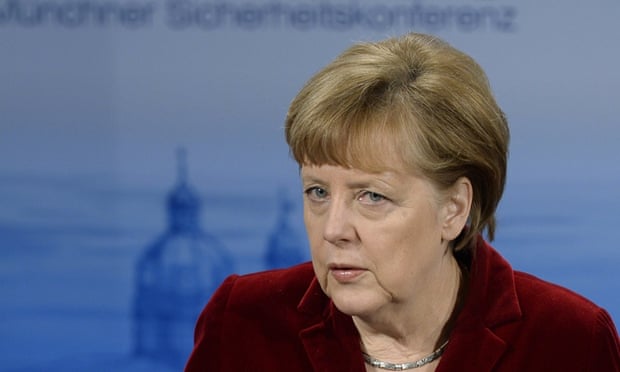German chancellor admits, however, that she is unsure whether the current diplomatic push to end the conflict in the east of the country will succeed.

Angela Merkel has said the crisis in Ukraine will not be solved by military means, and that the peace agreement struck last September needs to be implemented.
Speaking at the Munich security conference on Saturday, the German chancellor said she wanted to secure peace in Europe with Russia and not against it.
Germany has opposed aiding Ukrainian troops for fear of worsening the conflict, which has already cost more than 5,000 lives, but the idea has many supporters in Washington.
“I cannot imagine any situation in which improved equipment for the Ukrainian army leads to President Putin being so impressed that he believes he will lose militarily,” Merkel said. “I have to put it that bluntly.”
Disagreement has emerged between Europe and the US about how best to confront Putin as Moscow-backed rebels make gains in eastern Ukraine. Barack Obama is under pressure from some in Congress to sent weapons to Kiev.
Nato’s top military commander, US Air Force general Philip Breedlove, gave the strongest signal yet in Munich that he wanted the west to consider sending weapons to Ukraine.
“I don’t think we should preclude out of hand the possibility of the military option,” he said, adding: “There is no conversation about boots on the ground.”
Merkel told the conference she could not be certain the talks she and the French president, François Hollande, held on Friday in Moscow with the Russian leader would result in a peaceful solution to the crisis.
“But it is in my view and the French president’s view definitely worth trying. We owe it to the people affected in Ukraine, at the very least,” she said.
Hollande said: “If we don’t manage to find not just a compromise but a lasting peace agreement, we know perfectly well what the scenario will be. It has a name, it’s called war.”
The Russian foreign minister, Sergey Lavrov, said he hoped sincerely that the latest diplomatic drive would “produce results, and those results will be supported by the parties to this conflict”.
The Ukrainian president, Petro Poroshenko, said a peace proposal aimed at ending clashes with pro-Russian separatists in eastern Ukraine could work.
Merkel is expected to meet the US secretary of state, John Kerry, and Lavrov on Saturday, along with Poroshenko and the US vice-president, Joe Biden.
The focus at the Munich conference is on a new blueprint agreed in overnight talks in Moscow between Putin, Merkel and Hollande. The aim is to reach a solution to the crisis before it turns into a major east-west confrontation.
No details were released about the Moscow talks, but the new plan is likely to be based on the failed September Minsk ceasefire and peace accords that the west accuses Moscow of failing to adhere to.
“Work is under way to prepare the text of a possible joint document to implement the Minsk agreements,” said Putin’s spokesman, Dmitry Peskov, who described the Moscow talks as “substantial and constructive”.
Merkel and Hollande, who both left Moscow late on Friday night, made no public comment after the meeting and are to discuss the plan again with Poroshenko by telephone on Sunday.
German media broadly welcomed the latest initiative on Saturday, saying time was running out to avoid a disaster for Europe.
Spiegel Online said that with Merkel expected to meet Barack Obama on Monday, “this weekend will be crucial for how the crisis in eastern Ukraine and relations with Russia develop”.
“If Merkel fails in Moscow, the US will want to punish Putin,” it said.
Fighting in eastern Ukraine has claimed the lives of five civilians in the past 24 hours, government and rebel officials said.
After a limited truce to allow civilians to escape the violence offered some hope on Friday, the Ukraine government said missiles hit the embattled town of Debaltseve on Saturday.
(Source: Chris Johnston and agencies)































